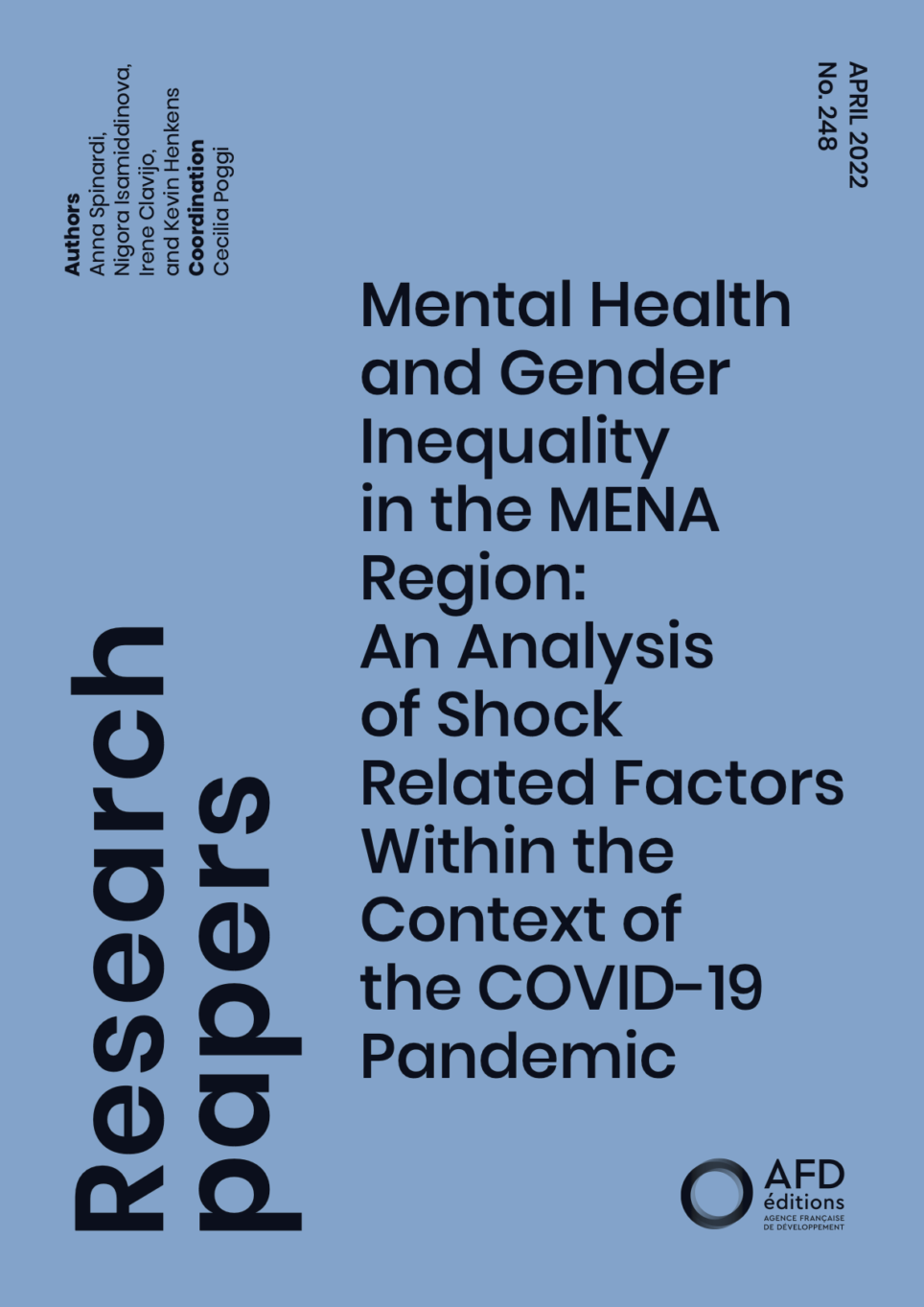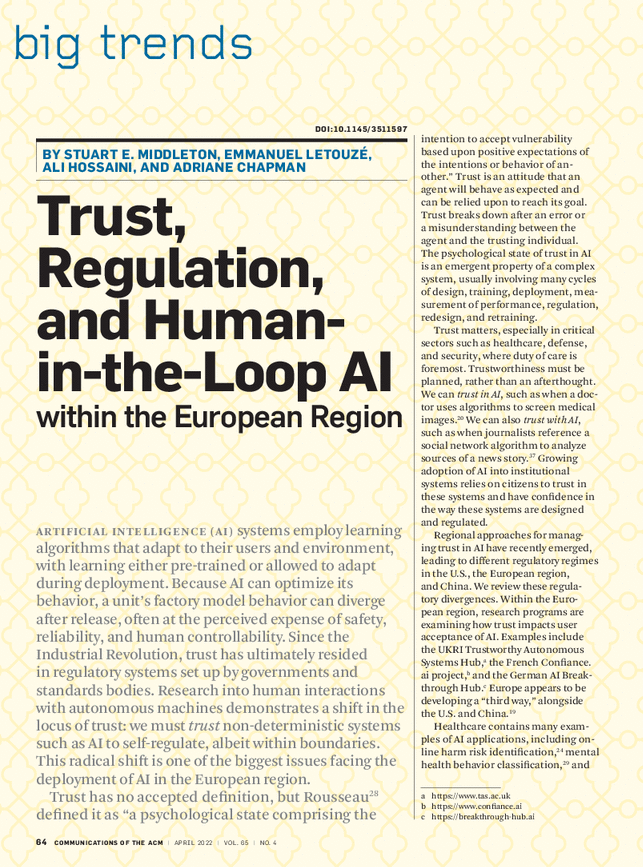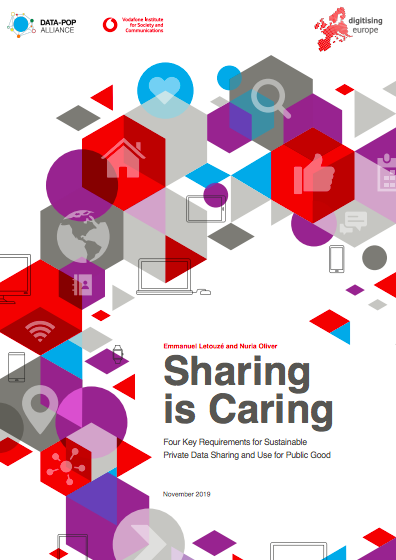This paper investigates the potential associations between factors that affected households during the pandemic (such as food insecurity) and the gendered mental health inequalities in the MENA region. To analyze these potential associations, the paper used data from the World Health Organization (five-question module to measure mental health and well-being) and the ERF COVID-MENA Monitor Survey panel dataset. The results … Read More
Trust, Regulation, and Human-in-the-Loop AI within the European Region
Artificial Intelligence (AI) systems employ learning algorithms that adapt to their users and environment, with learning either pre-trained or allowed to adapt during deployment. Because AI can optimize its behavior, a unit’s factory model behavior can diverge after release, often at the perceived expense of safety, reliability, and human controllability. Since the Industrial Revolution, trust has ultimately resided in regulatory systems … Read More
Socio-economic, built environment, and mobility conditions associated with crime: A study of multiple cities
Nowadays, 23% of the world population lives in multi-million cities. In these metropolises, criminal activity is much higher and violent than in either small cities or rural areas. Thus, understanding what factors influence urban crime in big cities is a pressing need. Mainstream studies analyse crime records through historical panel data or analysis of historical patterns combined with ecological factor … Read More
Mobile phone data and COVID-19: Missing an opportunity?
This paper describes how mobile phone data can guide government and public health authorities in determining the best course of action to control the COVID-19 pandemic and in assessing the effectiveness of control measures such as physical distancing. It identifies key gaps and reasons why this kind of data is only scarcely used, although their value in similar epidemics has … Read More
Sharing is Caring: Four Key Requirements for Sustainable Private Data Sharing and Use for Public Good
How data are shared and used will determine, to a large extent, the future of democracy and human progress. In this context, the authors of the paper “Sharing is Caring” describe four key requirements that must inform European efforts to ensure that private data are shared and used for the public good in a safe, ethical, and sustainable manner. This … Read More
Big Data para o bem comum
Desde o início do século XX, a maioria de nossas ações e interações tem sido mediada e capturada por dispositivos eletrônicos. Os rastros de dados deixados pelo caminho resultam no que foi batizado de big data. Embora a exploração do big data tenha sido desenvolvida por gigantes da internet, que transformaram a mineração dessas migalhas digitais em uma de suas … Read More
Evaluación de nuevas herramientas y técnicas del big data para proyectos del Banco Interamericano de Desarrollo
El presente estudio identifica herramientas innovadoras de Big Data a partir de casos de estudios basados en cinco proyectos en vía de implementación por el Banco Interamericano de Desarrollo (BID) en los países de la Comunidad Andina (CAN) con el fin de que nuevas tecnologías puedan ser aprovechadas e implementadas en estos u otros proyectos de inversión de la región. … Read More
Mobiliser et humaniser la Révolution des Données pour la statistique publique, le développement et la démocratie “
Note au Bureau Pays du PNUD Togo
Understanding the Relationship Between Short and Long Term Mobility
Populations are highly mobile, both in terms of long term movements of individuals relocating their place of residence as well as shorter term mobility such as commuting, seasonal travel and recreational trips. Working with call detail record data from Namibia and Senegal, we study population migration and its link to short term movement. We compare the short term mobility estimates extracted … Read More
Characterizing and Analyzing Urban Dynamics in Bogota (From the Paper Series: “Big Data to Address Global Development Challenges”)
Using open data and mobile phone records, we explore this link with a spatial regression model that analyzes the environmental and the social conditions to which each part of the city is exposed. We found that physical characteristics of the city connected to higher urban diversity better explain the emergence of crime than traditional socio-economic conditions and, together, physical characteristics … Read More
Fair, Transparent and Accountable Algorithmic Decision-making Processes
The combination of increased availability of large amounts of fine-grained human behavioral data and advances in machine learning is presiding over a growing reliance on algorithms to address complex societal problems. Algorithmic decision-making processes might lead to more objective and thus potentially fairer decisions than those made by humans who may be influenced by greed, prejudice, fatigue, or hunger. However, … Read More
Socio-Physical Vulnerability to Flooding in Senegal
Each year thousands of people and millions of dollars in assets are affected by flooding in Senegal; over the next decade, the frequency of such extreme events is expected to increase. However, no publicly available digital flood maps, except for a few aerial photos or post – disaster assessments from UNOSAT, could be found for the country. This report tested … Read More
Leveraging Algorithms for Positive Disruption: On data, democracy, society and statistics
The main objective of this paper is to discuss whether and how the future of algorithms can be crafted such that their development and deployment—from their design to their use, including control, evaluation, auditing, governance—be based on and foster core democratic values such as accountability, transparency, participation, and collaboration. In doing so, we will focus on algorithms affecting public life … Read More
Big Data for Climate Change Resilience
This paper (in progress) outlines the Data–Pop Alliance’s ongoing research on Big Data, climate change and environmental resilience. The paper dives deeply into the conceptualization of climate change resilience, both specific and general; addresses Big Data contributions to understanding the components of climate risk; and identifies gaps and challenges to Big Data applications to climate resilience decision-making. Finally, authors offer … Read More
Big Data for Climate Change and Disaster Resilience: Realising the Benefits for Developing Countries
This report explores the opportunities, challenges and required steps for leveraging this new ecosystem of Big Data to monitor and detect hazards, mitigate their effects, and assist in relief efforts. Ultimately the goal is to build resilience so that vulnerable communities and countries as complex human ecosystems not only ‘bounce back’ but also learn to adapt to maintain equilibrium in … Read More















